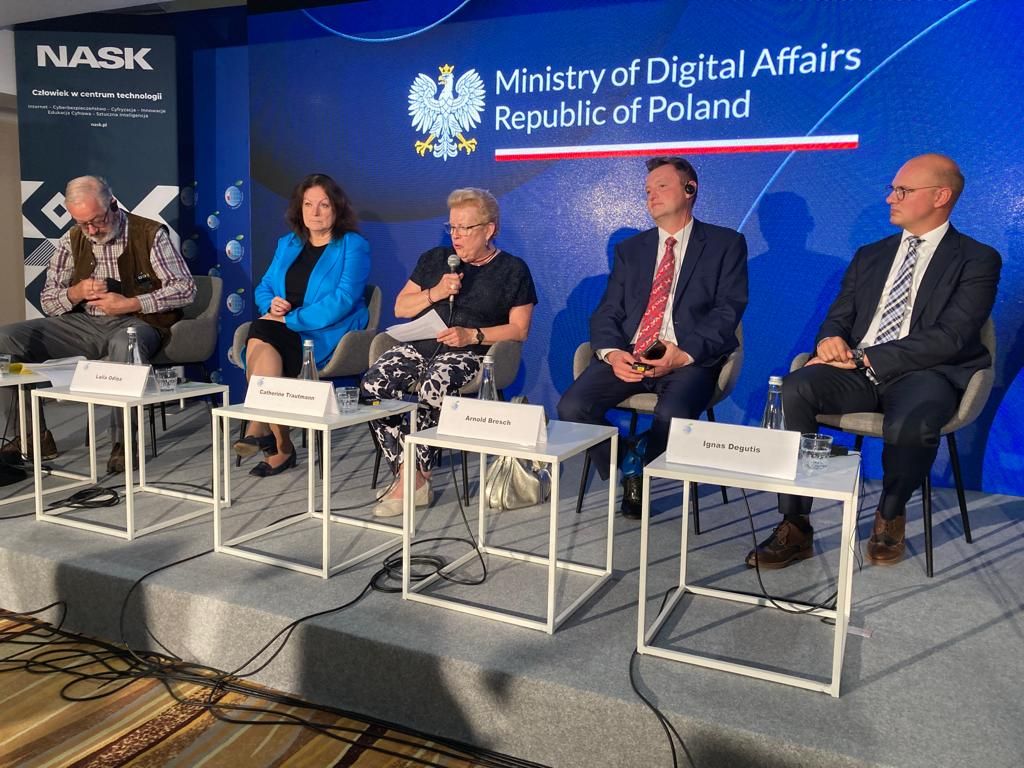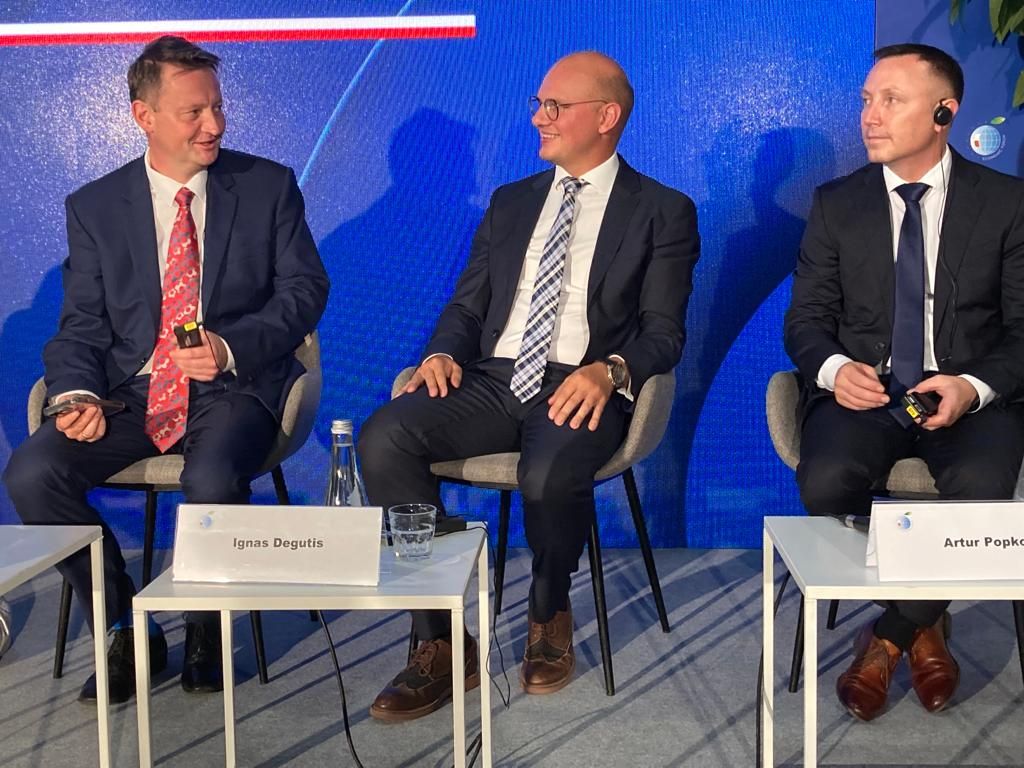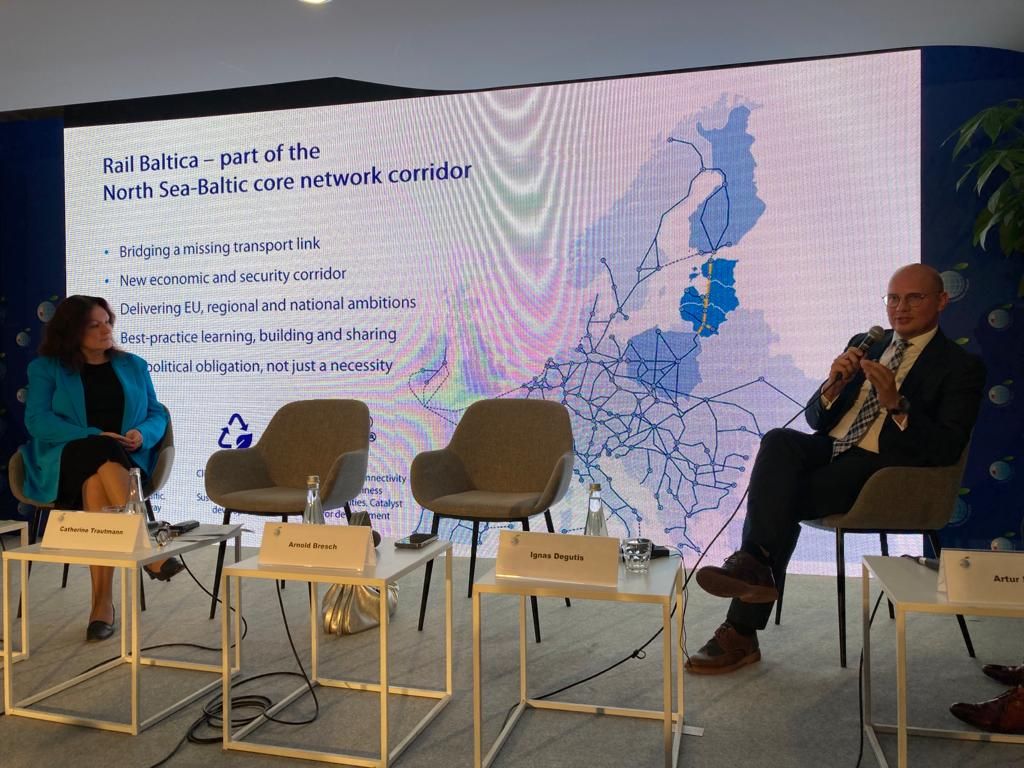At the beginning of September 32nd Economic Forum was held in Poland, Karpacz focused on the topics around the “New Values for the Old Continent – Europe on the Threshold of Change”. To provide insights and Rail Baltica global project perspective, Ignas Degutis, Chief Financial Officer at RB Rail AS took part in the discussion panel regarding the Trans-European Transport network and key directions of the development and challenges in the context of the ongoing War in Ukraine.
The news portal DELFI talked with Ignas Degutis about his insights gained during the Forum.
What was the purpose of your participation in the Economic Forum in Poland?
I.D.: By participating in events of such kind, we aim to present the project as an important infrastructure project that will have an impact on the region and on European economic growth. Our aim was to contribute to the debate on European economic development and cooperation through the perspective of the Rail Baltica project. Rail Baltica is not just a mega-project in the field of railways or construction. It is first and foremost a social and economic project, which must serve the people and is also of great importance for the security of the Baltic States. It will ensure fast, safe, and sustainable transport connections in Europe and the Baltic States.
Logistics plays an important role in the military. It is also a security subject. It is important to understand that we cannot rely only on roads and aviation to ensure connectivity. Rail Baltica will make the Baltic countries an integral part of Western Europe and ensure their independence from the East. A modern high-speed rail link is particularly important in the current geopolitical environment – our transport network needs to be resilient – it needs to be operational, reliable, security-enhancing and protected from unwanted external intervention.

Rail Baltica is a project not only for the future, but also for the present, and it is already delivering real benefits for business. The European rail line from Poland to the Kaunas intermodal terminal is already operating. Since last year, freight trains with containers and semi-trailers have been running from Kaunas Intermodal Terminal towards Western Europe. Without Poland, it is simply impossible to connect the Baltic States to Europe. We are already pleased with the good cooperation with our Polish partners, PKP PLK and CPK, who are rebuilding the railway network in Poland, and together we will ensure a smooth journey not only between the Baltic countries, but also to Poland and beyond. The imminent large-scale construction of Rail Baltica, which will see the start of priority sections of the line in all the Baltic States, makes it essential to maintain close relations with our strategic partners.
The topic of this year’s Forum is “New values for the old continent – Europe on the Threshold of change”. What do you think are the new values that should take shape in Europe?
I.D.: The war in Ukraine is a strong factor in the change in values. European leaders are debating more often than ever before which direction Europe should move forward. Both in Lithuania and in Poland, we have seen a huge wave of solidarity among Member States with Ukraine. The EU also stands for solidarity between Member States and citizens. Together we are stronger and more united in our diversity.
The new values in Europe include increased cooperation, development, and sustainability. This includes investment in infrastructure, as it contributes to economic growth and environmental protection. Moreover, in a changed context, it is more important than ever to promote transparency, the rule of law and democracy as core values that must be respected and fostered throughout Europe.
We need a high-quality and safe railway system. Efficiency creates safety and economic value. The European Union’s rail infrastructure needs to be much more tightly integrated and ideally should have only a one-track gauge. The integration of our rail infrastructure is symbolic – it shows where the Baltic countries want to belong. It is like a European integration train.
What old values do you think are no longer appropriate in Europe? What do you see as vicious in Eastern and Central Europe?
I.D.: I wouldn’t call them old values, but rather vicious trends that do not encourage economic development and cooperation between countries. I am referring to protectionist tendencies that hinder the free development of trade and relations. This can include systems that tend towards corruption. It is no secret that corruption is a challenge for Ukraine in the context of war. On the other hand, the war factor and the harsh geopolitical situation have made us think about what kind of Europe we want, and this has served to unite Europe even more.

The Forum’s agenda covered topics such as security, energy, international politics, sustainability, etc. What was the focus of the Forum?
I.D.: It is encouraging that there was a very strong sense of support for Ukraine in the Forum, whatever the topic. The focus was on topics related to the changed geopolitical situation – the war in Ukraine and the challenges that this brings – security, energy, international politics, leadership, and sustainability.
One of the things that stood out was the idea that we also need to be concerned about the growth of our own economies because in this context we can finance Ukraine more. Ukraine’s own development as a country is also important. And already we are thinking about the reconstruction of Ukraine. Unfortunately, however, corruption in Ukraine is seen as one of the major challenges that must be tackled.
Rail Baltica is part of the Trans-European Transport Network (TEN-T). It is a European Union instrument aimed at ensuring the territorial cohesion of the Union and facilitating the free movement of goods and people.
TEN-T covers rail, road, and waterways, as well as seaports, airports and road and rail terminals. A recent decision was taken to include Ukraine in the future TEN-T network. Thus, the Ukrainian cities of Lviv, Kyiv and Mariupol are planned to be connected to the European railway in the future, thus ensuring uninterrupted mobility with the rest of Europe. This is great news and a clear signal – both to Ukraine and to the rest of Europe – of what and where Europe is. And, for Poland, the incorporation of Ukraine in the TEN-T corridor will place it at the centre between the Baltic States and Ukraine.
The inclusion of Ukraine opens a huge market for European countries. One example is the export of cereals. Ukrainian cargo is transported by container trains, with dual transshipment at the Ukrainian-Polish border and at terminals in Lithuania (Šeštokai and Kaunas). The construction of Rail Baltica and the connection of Ukraine to the European railway would ensure uninterrupted freight traffic. This would also benefit Lithuania, which is our only way of development – more so when the markets of our aggressor neighbours are completely closed to us.

Thus, an economic corridor is being created linking the north of Europe with the southern part of the continent, with Ukraine and the Balkans in the future. An efficient transport system contributes to the proper functioning of the single internal market and boosts the economic growth of Member States.
How much attention has been paid to the Rail Baltica project? Has there been any discussion on the subject, and if so, what has been discussed?
I.D.: It is gratifying that the Rail Baltica project has attracted a lot of attention. It was a priority before the war and now it is considered a geopolitical necessity at the pan-European level.
It is important for the security of the Baltic States, for economic opportunities and for travel within the Baltic States. The discussions at the Forum also focused on the benefits, financial perspectives, and progress of the project.
Each year, the Forum makes important declarations and decisions. What are the most important conclusions you have drawn from this Forum?
I.D.: The need remains to increase cooperation and investment in infrastructure, and promote sustainability and regional security. The discussions at the Forum clearly show that the Rail Baltica project can contribute to these objectives and, most importantly, that the project partners have no doubt about it.
